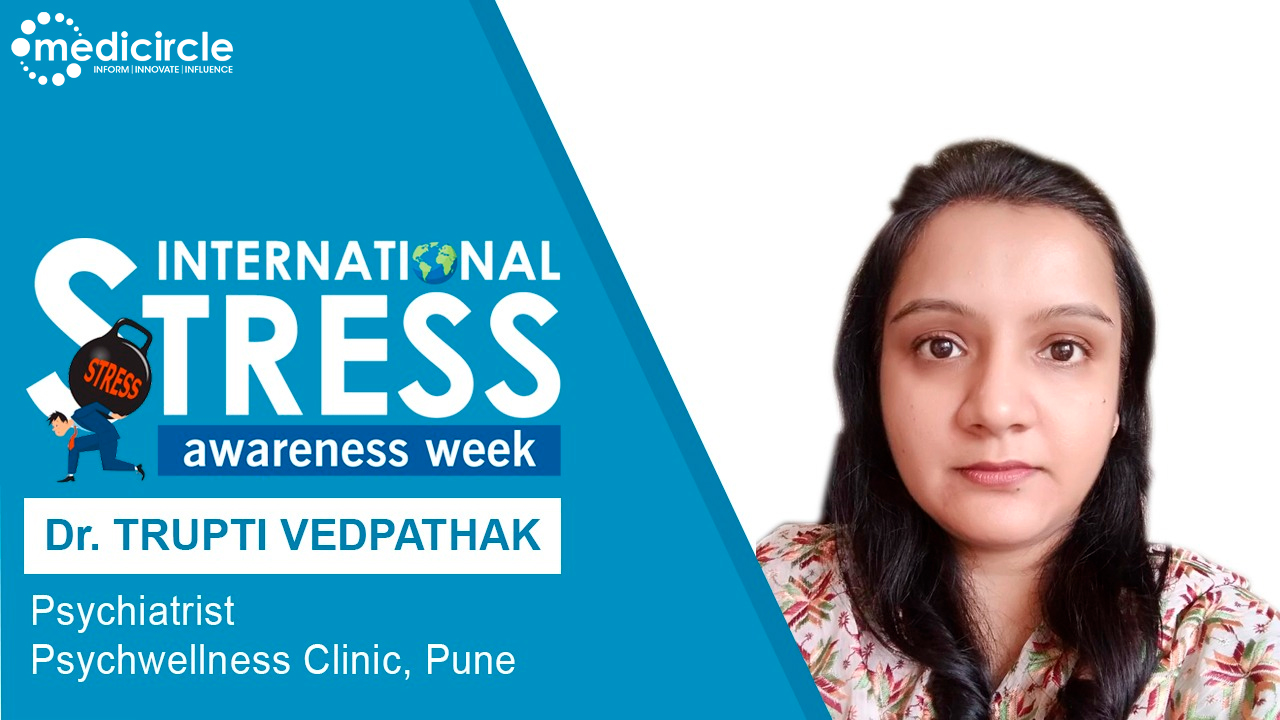International Stress Awareness Week is celebrated every first week in the month of November to raise awareness of the challenges and burdens associated with dealing with stress daily. The day was launched by the International Stress Management Association. Many people across the world have gone through tough times due to the COVID-19 outbreak.
Even before the pandemic, India was labeled as the most stressed country. Where the global average of stress is 86%, 89% of Indians suffered from stress in 2019. That is 9 in every 10 people suffer from stress.
On the occasion of International Stress Awareness Week, we at Medicircle are conducting an exclusive awareness series wherein we will be featuring experts in this field to understand and create more awareness about the effects of stress.
Dr. Trupti Vedpathak is a Consultant psychiatrist with 15years of experience in psychiatry in diverse settings in major cities viz. Birmingham, Mumbai, Bangalore & Pune. She has UK medical council registration (MRCPsych, UK) & experience in psychiatry at the National Institute of Mental Health & Neurosciences (Nimhans),(2010) which is the topmost mental health institute in India. She practices as a Consultant psychiatrist at her Clinic -Psych Wellness clinic, Pune. Dr. Trupti Vedpathak also provides counseling sessions along with psychiatric consultation.
All you need to know about stress
Dr. Trupti Vedpathak says, “Stress is a general term and everybody has gone through stress. Everyone faces stress in life. Stress is a normal response in our body due to challenging situations like spring with loads attached to it. Spring goes through stress and pressures to handle the load. The stress of the spring with load or reduced capacity. Similarly we face stress due to load and pressure in challenging situations which may affect our capability to deal with stress. We may find it difficult to handle stress during a situation.”
Mental stress and well being
Dr. Trupti Vedpathak says, “Mental stress and well-being are interrelated. Mental stress can be divided into 2 broad categories-
Positive stress - This stress helps us grow and improves our confidence and helps us to deal positively with the situation. Distress - This stress has a negative impact on the body. People get distressed when they cannot handle problems and this affects their minds and body. This may affect the functioning and daily activities of mind and body.”
Dealing with stress
Dr. Trupti Vedpathak says, “Chronic stress can lead to major problems like
Lack of sleep Appetite changes Irritability Lack of concentration Physical problems such as headache Skin infection like acne Hair Loss
If you are suffering from these symptoms, it is a “wake up call and alert signal” to do something about stress to reduce it to a tolerable level.”
Stress in youngsters
Dr. Trupti informs, “This is very common these days. Many people don't seek help for the stress and try to work it on their own. People especially youngsters turn to-
Drinking Smoking Addiction Drugs Behavior addiction Video gaming Internet addiction
This addiction can give temporary relief and can have disastrous effects. They start with one problem with stress and then add up to other problems of addiction.”
Fatality of stress
Dr. Trupti informs, “Short term stress is a normal response and the body releases stress hormones like adrenaline and cortisol which is a normal part to cope up with stress and fight it out. If there is long term stress it can affect our body -
High pulse Increased breathing High blood pressure High sugar levels Ulceration of gastrointestinal tract Depression Anxiety.”
Advice for stress management
Dr. Trupti informs, “The advice for stress management is -
Take care of mental and physical health. Improve overall health Good lifestyle Healthy diet Exercise Work on shortcomings with anger management and anxiety issues. Build a social network.”
(Edited by Dr.Rati Parwani)

 Dr. Trupti Vedpathak informs the causes of stress being normal and how to cope up with it. She further explains how to reach out to your doctor and counselor who can help you deal with stress in the right manner. Stay tuned till the end of the video to know about how to deal with stress and one piece of advice that can change your life.
Dr. Trupti Vedpathak informs the causes of stress being normal and how to cope up with it. She further explains how to reach out to your doctor and counselor who can help you deal with stress in the right manner. Stay tuned till the end of the video to know about how to deal with stress and one piece of advice that can change your life.




.jpeg)
.jpeg)

.jpeg)
.jpeg)

.jpeg)

_(1)_(1)_(1).jpeg)
.jpeg)





.jpeg)

.jpeg)

.jpeg)
.jpeg)
_(1).jpeg)
.jpeg)




